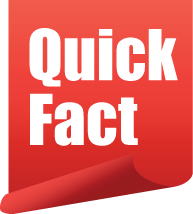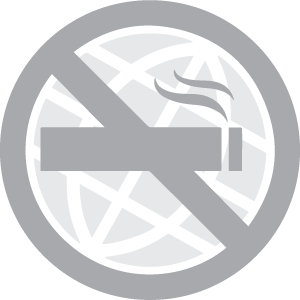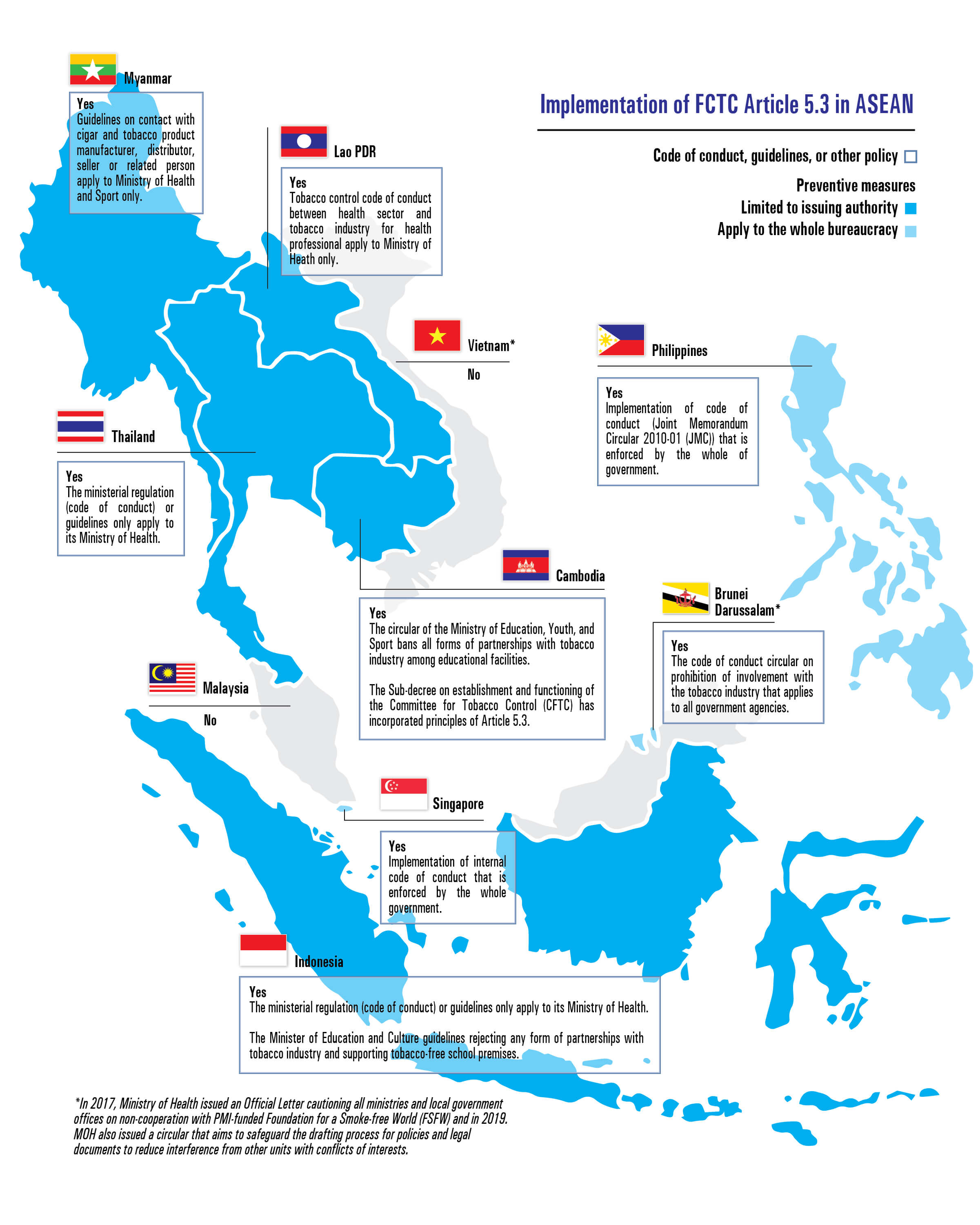Insulating Public Health Policies from Industry Interference
The tobacco industry is not like any other business. Despite selling a highly addictive and inherently defective product that kills up to two thirds of its consumers, it continues to escape commensurately stringent regulation of its business and products by interfering at all levels of tobacco control policy development and implementation. Through both overt and covert means, the industry uses its massive resources to deter and thwart governments' efforts from implementing effective tobacco control measures and protecting public health policies. Tobacco industry interference remains a major problem in the ASEAN region as in other parts of the world.
The tobacco industry employs an extensive range of unethical and intentionally orchestrated tactics and strategies, at both the country level and internationally, to directly and indirectly challenge, defeat, discredit, dilute, obstruct, delay and circumvent implementation of effective tobacco control measures. These include political lobbying to manipulate and hijack the political and legislative process through drafting and distributing industry-friendly legislation, providing incentives to government officials and politicians to take a pro-industry position, and hiring former prominent government officials or appointing them to be tobacco industry spokespersons or board members. Other tactics include intimidating governments and individuals with litigation or threat of legal suit, mobilizing front groups to advance its cause, and making false claims and spreading half-truths and misinformation through position papers, news items, posters, and paid ads.
Article 5.3 of the WHO FCTC requires Parties, when setting and implementing their public health policies with respect to tobacco control, to protect these policies from commercial and other vested interests of the tobacco industry in accordance with national law. By unanimously adopting the WHO FCTC Article 5.3 Guidelines at the third session of the Conference of the Parties (COP3) in 2008, Parties to the treaty formally recognized the irreconcilable conflict between the tobacco industry's interests and public health policy interests.
Within ASEAN, eight countries (Brunei, Cambodia, Indonesia, Lao PDR, Myanmar, Philippines, Singapore and Thailand) have taken concrete steps to protect their public health policies from tobacco industry interference by developing a policy, guidelines, or a code of conduct to prevent unnecessary interactions with the industry and ensure transparency of any interactions that do occur, while Malaysia and Vietnam still have to institute similar preventive measures in line with the Article 5.3 Guidelines. Only Brunei, Philippines and Singapore introduce a whole-of-government code of conduct or policy that prohibits unnecessary government interactions with the tobacco industry.
Regardless of such actions taken, there has been increasing industry interference in many countries, and this is expected to continue into the future. Hence there remains much room to institute or strengthen mechanisms at the highest levels to prevent or reduce such industry interference in tobacco control.
Tobacco companies' timeline of public deception
For decades, the tobacco industry has deceived the public for purposes of gaining more profit.
1950s
Harms of smokingConcealed evidence that cigarettes cause cancer while marketing products as safe
1960s
Addictiveness of smoking and nicotineConcealed evidence that cigarettes are highly addictive and in the 90s, swore under oath to deny it
1970s
Link of smoking to cancerSpent enormous amount of resources on disinformation campaigns and propaganda to negate and deflect the science clearly linking smoking to cancer
1980s
Harms of secoundhand smokeHired 'independent' scientists to support industry studies and questioned smoke-free policies
1990s
Dangers of tobacco's youth smoking prevention campaignsAimed programs not at reducing youth smoking but at harnessing “positive feelings” for tobacco companies
2000s
Benefits of smoking “light” and “mild” Misled the public that products are safer, use light/mild cigarettes to leverage on smoker's health concern to increase sales, and even designed new products that increase nicotine intake
Supporting WHO FCTC Falsely claimed that it is supportive of the WHO FCTC but in its internal documents, called the measures compliant with FCTC as “extreme”
Global Center for Good Governance in Tobacco Control (GGTC)
The Global Center for Good Governance in Tobacco Control was designated by the FCTC Secretariat to serve as the Knowledge Hub for Article 5.3 to support implementation of the Convention's obligation on protecting against tobacco industry. In 2019, the Knowledge Hub for Article 5.3 (GGTC) provided technical support to at least 12 countries in 8 regions to advance Article 5.3 implementation: Setting up Tobacco Industry Observatories and disseminating tools to counter tobacco industry tactics.

Monitoring center



Implementation of FCTC Article 5.3 in ASEAN
Industry interference in policy development
The tobacco industry (TI) works to defeat, dilute, and delay effective tobacco control policy. They participate in different stages of policy development in order to undermine any stringent measure a government may propose.

Brunei

Cambodia

Myanmar

Thailand


Industry-related CSR activities
Tobacco companies are re-branding themselves as “socially responsible” and a “legitimate partner” for social and development causes. They use corporate social responsibility (CSR) activities to circumvent laws regulating the industry, and as a strategy to gain access to elected officials who are empowered to approve and implement tobacco control policies. The industry engages with non-health government sectors such as sports, education, environment, welfare and development, and law enforcement to whitewash its business agenda and dissociate its corporate image from the health harms caused by the products it manufactures and sells.

Brunei

Cambodia

Lao PDR

Myanmar

Singapore

Thailand

Vietnam

Benefits to the tobacco industry
Except in Brunei and Vietnam, the tobacco industry continues to receive benefits in a variety of ways in most countries because their governments still associate economic value in the tobacco industry's business portfolio. Because of this preconception, the tobacco industry gains political capital to influence policies to its advantage.

Cambodia

Indonesia

Malaysia

Thailand




Forms of unnecessary interaction
Unnecessary interactions between government personnel and the tobacco industry still occur. With the exception of Brunei, all countries have documentation of such interactions that include senior government officials attending social functions with or accepting assistance and offers of partnerships from the tobacco industry.

Cambodia

Indonesia

Lao PDR

Malaysia

Philippines

Thailand

Vietnam
Attending social functions and junkets




Accepting assistance and offers of partnerships


Greater transparency needed
Most governments have no procedures in place for the disclosure of meetings and interactions with the tobacco industry or about entities, affiliates organizations and individuals acting on the industry's behalf such as lobbyists. While the tobacco industry can communicate with the government regarding its business, systematic recordkeeping to document what transpires or how the industry's agenda might impact policy (such as when the meetings take place, their purposes, or the contents and outcomes of such meetings) remains lacking.

Malaysia

Myanmar

Philippines

Thailand

Vietnam





Myanmar

Philippines

Conflicts of interest

Brunei

Lao PDR

Vietnam


Philippines

Thailand


Cambodia

Indonesia

Lao PDR

Philippines

Thailand

Vietnam

| Country | Current/ former public service/ private sector employees | Position/part of |
|---|---|---|
| Cambodia | President of the LYP Group (owner of cigarette company Hero King) | Senator |
| Indonesia | Director of Beverage Industry, Tobacco Products and Refresher Materials, and the Head of Data and Information Center | Indonesian Cigarette Manufacturers' Association (GAPPRI) |
| Lao PDR | Vice Minister of Ministry of Industry and Commerce (MOIC), MOF and MOIC representatives | Chair of the LTL Board Board of Management |
| Philippines | Former Chief Justice and former Governor of the Philippine Central Bank | Board of Trustees of Tan Yan Kee Foundation |
| Thailand | CEO of Tobacco Authority of Thailand (TOAT) | Government official |
| Vietnam | Ministry of Industry and Trade (MOIT) officials | Vinataba |
Preventive measures
Article 5.3 details guidelines to protect against interference, not only by the tobacco industry but also by entities working in its behalf. Two elements are essential for achieving this outcome: a) governments need information about the industry's activities and practices to ensure transparency and accountability; and b) a code of conduct for the bureaucracy prescribing the standards they should comply with in their interactions with the tobacco industry or its representatives.

Brunei

Cambodia

Indonesia

Malaysia

Myanmar

Philippines

Thailand

Vietnam



| Country | Preventive measures limited to issuing authority | Position/part of |
|---|---|---|
| Brunei | Prime Minister Circular (code of conduct) - Prohibition of involvement of the tobacco industry and smoking in government premises Prevention of Corruption Act* |
|
| Cambodia | Ministry of Education, Youth, and Sport Circular on ban all forms of partnerships with tobacco industry among educational facilities including ban the use, advertisement, and display and sale of tobacco and alcohol products within campuses of public and private educational facilities | Law on Anti-Corruption* |
| Indonesia | Ministry of Health Guidelines for Managing Conflicts of Interest with the Tobacco Industry within the Health Ministry | Ministry of Administrative and Bureaucratic Reforms Guidelines for Managing Conflict of Interest* Several anti-corruption laws* |
| Lao PDR | Ministry of Health Tobacco Control Code of Conduct between Government Health Sector and Tobacco Industry | Law on Anti-corruption* |
| Malaysia | Anti-corruption Commission Act* | |
| Myanmar | Ministry of Health and Sports Guidelines on contact with cigar and tobacco product manufacturer, distributor, seller or related person | Anti-corruption Code of Ethics for Companies and Corporate Bodies* |

Philippines

Thailand

Vietnam
| Country | Preventive measures limited to issuing authority | Position/part of |
|---|---|---|
| Philippines |
Department of Education (DepEd) Order No. 6, s. 2012 - guidelines against tobacco industry interference Department of Labor and Employment (DOLE) Memorandum (30 April 2012) - reiterates the JMC Bureau of Internal Revenue (BIR) Memorandum Order No. 16-2012 - restricts interactions with the tobacco industry Department of Foreign Affairs (DFA) Memorandum (24 May 2013) - directs compliance with the JMC Metro Manila Development Authority (MMDA) Memorandum (20 August 2013) - amends the Code of Conduct to include protection against tobacco industry interference Department of Social Welfare and Development (DSWD) Administrative Order No. 11-2019 - guidelines against tobacco industry interference Food and Drug Administration (FDA) Advisory No. 2019-501 - reminds public physicians to follow the JMC and avoid interaction with the tobacco and electronic nicotine delivery systems (ENDS) industry |
Senator |
| Thailand | Ministry of Public Health Guidelines on Interaction with Tobacco Entrepreneurs and Related Persons | Office of Civil Service Commission Regulation Several anti-corruption laws* |
| Vietnam | Ministry of Health Official Letter to other ministries, mass organizations, and the people's committees of the provinces and municipality on non-cooperation with Smoke-free World Foundation funded by PMI Anti-corruption Law* |

